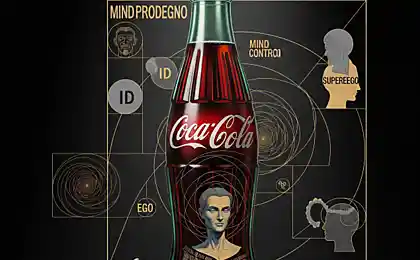739
Protective mechanisms of the psyche
Psychological defense operates against the will of man, when something threatens his emotional balance, his mental safety, image of himself.
Let us consider the protective mechanisms of our psyche.
1. Eviction.
The first was opened the mechanism of repression. Using the displacement of consciousness are removed and held in the unconscious are unacceptable or traumatic human experiences, circumstances, or information. With the displacement associated with many cases of forgetfulness, which allows not to remember something that could shake the sense of themselves.

An example of the mechanism of displacement can be represented as follows: if I feel a sense of shame for the act committed by me in relation to another person, but this experience quickly "evaporates" from my memory, I begin to assess itself without regard to the indecent act. But the other person that my behavior hurt, will be good to remember that I "already forgotten". And my self-esteem without considering the opinion of other about me would be incomplete. Consequently, disturbing and not very clear worries, it is desirable to realize and perform to them to adjust their self-esteem.
2. Rationalization.
When the rash step leads to unpleasant consequences, man seeks to justify his action. This is done not intentionally, but subconsciously, to preserve self-esteem at the proper level. For example, if one person without any apparent reason, was rude to the other, and his is called to account, he then tries to find the causes of your incontinence, so that his behavior seemed quite normal and only acceptable in this situation. This self-defense without sufficient reasons is opposed to an objective evaluation of their behavior. And this behavior in psychology is called rationalization of the motive.
Rationalization is a psychological defense mechanism, similar to a sweet shell of bitter drugs. Explanations, descriptions as "envelop" the traumatic fact that it starts being perceived as irrelevant or as indicating strengths, valuable and fair.
The mechanism of rationalization is well described in the famous fable of Krylov, "the Fox and the grapes". The mechanism of depreciation is not available, but highly desired object, phenomenon described there very precisely, but if the rationalization will be the rule for the person, then the contradictions between self-esteem and actual behavior will increase, which will inevitably lead to serious conflicts. Therefore,any event to which you have direct or indirect relationship, it is necessary to estimate without rationalizing the motives to your participation in the event did not downplay and not exaggerated. It can be painful for the ego, but is useful for self-knowledge.
3. Projection.
This protective mechanism of the psyche gives people the preservation of satisfying ideas about himself, about his psychological integrity by attributing your own unacceptable, for whatever reasons, feelings, desires, ideas others.
In each person there are positive and negative traits. If we know about his qualities and accept them in ourselves, we are loyal we treat other people who have similar traits. For example, if a man admits that sometimes he can be hotheaded, then forgive the same temper another. To know himself man are hampered by the fact that having some "negative" qualities, features of personality, which he doesn't like himself, he's not ready to fully accept. Then in his mind, these qualities are projected onto others and he turns his anger and resentment on them. This false sense allows you to maintain self-esteem, and therefore not rejected.
4. Substitution.
This action, aimed at any object, actually provoked, and they are not intended and caused by another inaccessible object. When a person is highly excited, for example due to unpleasant conversation with a colleague, but he cannot Express all his feelings in his address, he often "pulls pairs" on another unsuspecting person.The explosion of mood, severe agitation associated with failure, resentment or any other nuisance, severely restricts a person's consciousness, that is, make it dumber than it really is. In this state, few are able to evaluate their actions, to regulate the conduct subject to the requirements of self-respect.
5. Denial.
If the person does not want to see a really traumatic event, does not want to hear disturbing him, then he applies another powerful psychological defense called denial (except reality).
It aims not to accept as the reality of the events which disturb the mind. Denial can be reflected in the flight into fantasy, in an imaginary world, where are all our desires, where we are smart, strong, beautiful and successful. Some remain in the world of dreams alone, others fantasize aloud publicly talking about his "famous" friends, etc. the main purpose of using such a "positive self-presentation" is to increase the value of a person in the eyes of others.
6. Reactive education.
If the boy gives the girl a lot of trouble (pulling the braids away from lessons, etc.), then most likely he is attracted to her. Why the boy behaves this way?
The child begins to disturb the feeling of sympathy — the feeling, the essence of which he still does not understand. But he feels that "something bad" for his compliment. Hence, quite contrary to the sense of behavior, the opposite reaction. Similarly, a student who constantly disrupts lessons (shouting at them, distracting other students), really wants to attract attention, which he clearly lacks.
This happens not only with children. This kind of psychological protection presents in adults, who also sometimes exhibit the opposite reaction.
The isolation mechanism is a calling separation anxiety is part of the situation from the rest of the sphere of the soul. There is a sort of division of reality, in which traumatic events cause emotional reactions. For example, the child feels in the family well, but it strongly punished for "bad" behavior. As a result, the child "isolates" event that undermines his self-esteem continues to be positive to the parents: maybe in front of them behave "good", but demonstrates the prohibited conduct before the toys: beats and crushes them.
All of the above psychological protection do not contribute to personal human development. Only one psychological protection can be called successful. This sublimation.
7. Sublimation.
It is a psychological protection, which is the direction of energy sexually aggressive nature to other goals: creativity, science, art, intelligence development, sports, professional activities, collecting. This protection is considered to be constructive, as it has positive results and gives a person a sense of satisfaction. published
P. S. And remember, just changing your mind — together we change the world! ©
Join us in Facebook , Vkontakte, Odnoklassniki
Source: vk.com/brain_up?w=wall-70427221_14523
Let us consider the protective mechanisms of our psyche.
1. Eviction.
The first was opened the mechanism of repression. Using the displacement of consciousness are removed and held in the unconscious are unacceptable or traumatic human experiences, circumstances, or information. With the displacement associated with many cases of forgetfulness, which allows not to remember something that could shake the sense of themselves.

An example of the mechanism of displacement can be represented as follows: if I feel a sense of shame for the act committed by me in relation to another person, but this experience quickly "evaporates" from my memory, I begin to assess itself without regard to the indecent act. But the other person that my behavior hurt, will be good to remember that I "already forgotten". And my self-esteem without considering the opinion of other about me would be incomplete. Consequently, disturbing and not very clear worries, it is desirable to realize and perform to them to adjust their self-esteem.
2. Rationalization.
When the rash step leads to unpleasant consequences, man seeks to justify his action. This is done not intentionally, but subconsciously, to preserve self-esteem at the proper level. For example, if one person without any apparent reason, was rude to the other, and his is called to account, he then tries to find the causes of your incontinence, so that his behavior seemed quite normal and only acceptable in this situation. This self-defense without sufficient reasons is opposed to an objective evaluation of their behavior. And this behavior in psychology is called rationalization of the motive.
Rationalization is a psychological defense mechanism, similar to a sweet shell of bitter drugs. Explanations, descriptions as "envelop" the traumatic fact that it starts being perceived as irrelevant or as indicating strengths, valuable and fair.
The mechanism of rationalization is well described in the famous fable of Krylov, "the Fox and the grapes". The mechanism of depreciation is not available, but highly desired object, phenomenon described there very precisely, but if the rationalization will be the rule for the person, then the contradictions between self-esteem and actual behavior will increase, which will inevitably lead to serious conflicts. Therefore,any event to which you have direct or indirect relationship, it is necessary to estimate without rationalizing the motives to your participation in the event did not downplay and not exaggerated. It can be painful for the ego, but is useful for self-knowledge.
3. Projection.
This protective mechanism of the psyche gives people the preservation of satisfying ideas about himself, about his psychological integrity by attributing your own unacceptable, for whatever reasons, feelings, desires, ideas others.
In each person there are positive and negative traits. If we know about his qualities and accept them in ourselves, we are loyal we treat other people who have similar traits. For example, if a man admits that sometimes he can be hotheaded, then forgive the same temper another. To know himself man are hampered by the fact that having some "negative" qualities, features of personality, which he doesn't like himself, he's not ready to fully accept. Then in his mind, these qualities are projected onto others and he turns his anger and resentment on them. This false sense allows you to maintain self-esteem, and therefore not rejected.
4. Substitution.
This action, aimed at any object, actually provoked, and they are not intended and caused by another inaccessible object. When a person is highly excited, for example due to unpleasant conversation with a colleague, but he cannot Express all his feelings in his address, he often "pulls pairs" on another unsuspecting person.The explosion of mood, severe agitation associated with failure, resentment or any other nuisance, severely restricts a person's consciousness, that is, make it dumber than it really is. In this state, few are able to evaluate their actions, to regulate the conduct subject to the requirements of self-respect.
5. Denial.
If the person does not want to see a really traumatic event, does not want to hear disturbing him, then he applies another powerful psychological defense called denial (except reality).
It aims not to accept as the reality of the events which disturb the mind. Denial can be reflected in the flight into fantasy, in an imaginary world, where are all our desires, where we are smart, strong, beautiful and successful. Some remain in the world of dreams alone, others fantasize aloud publicly talking about his "famous" friends, etc. the main purpose of using such a "positive self-presentation" is to increase the value of a person in the eyes of others.
6. Reactive education.
If the boy gives the girl a lot of trouble (pulling the braids away from lessons, etc.), then most likely he is attracted to her. Why the boy behaves this way?
The child begins to disturb the feeling of sympathy — the feeling, the essence of which he still does not understand. But he feels that "something bad" for his compliment. Hence, quite contrary to the sense of behavior, the opposite reaction. Similarly, a student who constantly disrupts lessons (shouting at them, distracting other students), really wants to attract attention, which he clearly lacks.
This happens not only with children. This kind of psychological protection presents in adults, who also sometimes exhibit the opposite reaction.
The isolation mechanism is a calling separation anxiety is part of the situation from the rest of the sphere of the soul. There is a sort of division of reality, in which traumatic events cause emotional reactions. For example, the child feels in the family well, but it strongly punished for "bad" behavior. As a result, the child "isolates" event that undermines his self-esteem continues to be positive to the parents: maybe in front of them behave "good", but demonstrates the prohibited conduct before the toys: beats and crushes them.
All of the above psychological protection do not contribute to personal human development. Only one psychological protection can be called successful. This sublimation.
7. Sublimation.
It is a psychological protection, which is the direction of energy sexually aggressive nature to other goals: creativity, science, art, intelligence development, sports, professional activities, collecting. This protection is considered to be constructive, as it has positive results and gives a person a sense of satisfaction. published
P. S. And remember, just changing your mind — together we change the world! ©
Join us in Facebook , Vkontakte, Odnoklassniki
Source: vk.com/brain_up?w=wall-70427221_14523
Top 20 facts about the Optina monastery
As well sometimes get sick, so the running interrupt is the only means























